If you tow a large, heavy trailer, you need a hitch that can handle the weight. Gooseneck and 5th wheel hitches are both heavy-duty devices designed to connect a large trailer to the bed of a truck rather than to a receiver on (or, usually, under) the bumper.
Gooseneck and fifth-wheel trailers connect to hitches that are directly over the rear axle. This is critical because a truck can carry more weight positioned right above its rear axle than it can from a point located off the rear of the truck on a hitch ball (being positioned so far behind the pivot point of the rear axle means the tongue weight of a bumper-pull travel trailer pushing down on the hitch ball creates an even greater downward force (weight) on the truck’s rear axle).
In this post, we’re delving into the gooseneck vs 5th wheel hitch comparison to see how they differ and give you an idea of the advantages and disadvantages of each.
What Is a Gooseneck Hitch?
A gooseneck hitch is a trailer hitch that connects to a gooseneck ball mounted in the bed of a pickup truck. The ball is larger than a traditional ball hitch and sits in a hole mounted/built into the truck bed. Once you back up the truck to position it under the trailer tongue, the tongue is lowered over the ball and secured (and safety chains and wiring are connected).
Gooseneck hitches are commonly used for towing very heavy loads, such as large RVs, horse trailers, and flatbed trailers carrying large/heavy farm and construction equipment.
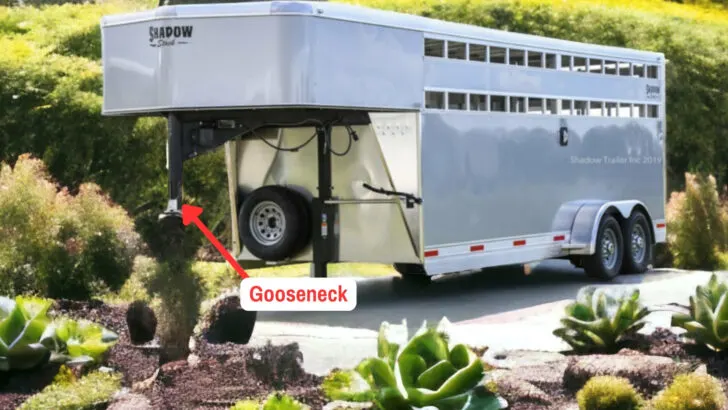
Large horse trailers are often gooseneck, allowing for greater maneuverability in tight spots.
Advantages of Gooseneck Hitches
Gooseneck hitches have several advantages over 5th-wheel hitches:
Towing Capacity
Gooseneck trailers typically have a higher towing capacity than 5th-wheel trailers, making goosenecks better capable of hauling very heavy loads. Gooseneck hitches can tow more than 30,000 pounds, which is why they’re often used to carry very large RVs (like the largest 5th-wheel trailers), heavy-duty agricultural equipment, flatbed trailers, and horse trailers.
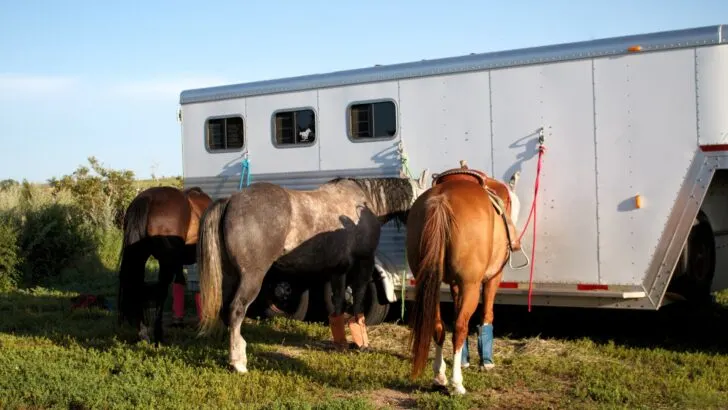
Gooseneck trailers typically have a higher towing capacity than fifth-wheel trailers, so they can carry heavier loads like livestock.
Stability
With some types of trailers, gooseneck hitches provide a more stable towing experience, especially in windy conditions and at higher speeds. This is especially true of commercial and agricultural trailers.
Maneuverability
Gooseneck and 5th-wheel hitches provide greater maneuverability than traditional hitches, but a gooseneck hitch offers a tighter turning radius than a 5th-wheel hitch. This is especially helpful when navigating tight spaces or making sharp turns (as is often needed when hauling livestock on a farm or delivering heavy-duty equipment to a construction site).
Just be aware that you still need to be cautious about turning your towing vehicle too tightly, as you could still run the risk of the trailer impacting the rear/side of the truck.
Versatility and Simplicity
Gooseneck hitches are compatible with a wide range of vehicles, including long-bed and short-bed trucks. The ball hitch and safety chain anchors are easy to install and remove and don’t take up much room in the truck bed (even when installed and in use). The ball is lightweight and easy to operate, and the coupling mechanism is simple.
Note: Gooseneck trailers can be converted to 5th-wheel pin boxes. A standard gooseneck coupler’s inner pipe can easily be replaced to have a 5th-wheel kingpin at the base which will fit into an existing 5th-wheel hitch.
Disadvantages of Gooseneck Hitches
Despite all of its advantages, the gooseneck hitch is not the right choice for every situation.
Installation
Installation of a gooseneck hitch requires drilling holes in the truck bed (not just for the bolt holes to hold it in place, but also a hole large enough for the ball to be flipped upside down for storing when not in use) which could be undesirable for some and may require a professional.
Ride
Some gooseneck trailer owners find that gooseneck hitches contribute to a slightly rougher ride compared to trailers with 5th-wheel hitches, especially on uneven terrain. While goosenecks tend to offer a fair amount of stability in general, they tend to be less stable when towing tall trailers in high winds.
Noise
Gooseneck hitches tend to be somewhat noisy compared to 5th-wheel hitches. A lot of this may be a result of the greatly simplified mechanism, which often doesn’t include the dampening/quieting components that are included in the more complicated fifth-wheel hitch mechanism.
What Is a 5th Wheel Hitch?
A 5th-wheel hitch is also a type of trailer hitch commonly used for towing large recreational vehicles (RVs) and trailers. Unlike gooseneck hitches which connect to a ball mounted in the bed of a pickup truck, 5th-wheel hitches attach to a special plate mounted in the bed of the truck.
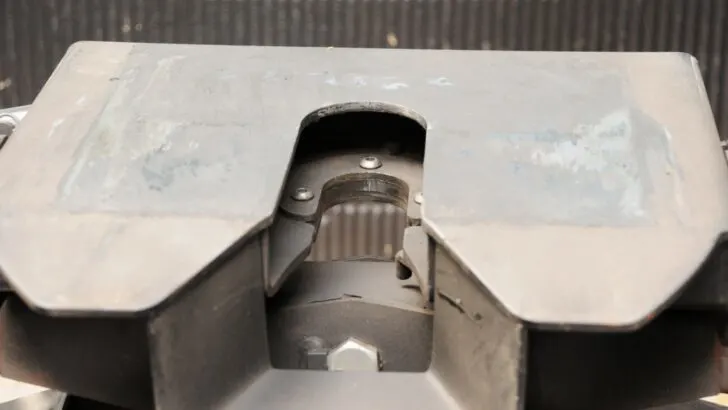
A 5th-wheel hitch sits on the floor of the truck bed. It has a plate where the trailer tongue rests, and jaws that grasp the kingpin of the trailer tongue.
A 5th-wheel hitch has an appearance similar to that of the hitch you commonly see on the back of a semi-truck. The hitch sits on the floor of the truck bed and has a plate where the trailer tongue rests, as well as jaws that grasp the kingpin of the trailer tongue. You attach your trailer by setting it at the appropriate height and then backing up the truck until the pin locks into the 5th-wheel hitch. You also need to connect the safety chains and trailer wiring, of course.
Advantages of 5th Wheel Hitches
There are several pros to 5th-wheel hitches that are important to consider in conjunction with your particular use case:
Stability
In general, 5th-wheel hitches tend to offer a smoother, more stable towing experience. This is particularly true with taller trailers when compared to gooseneck hitches. This means they offer more control over tall trailers that are susceptible to crosswinds. The larger, more robust connection mechanism contributes greatly to this stability.
Quieter
5th-wheel hitches tend to be quieter than gooseneck hitches in general. They often include components (rubber bushings or even airbags) that are designed to help quiet the hitch as it compensates for the different movements of the towing vehicle and trailer.
Versatility
5th-wheel hitches offer a different type of versatility than that associated with gooseneck hitches. There’s a wider variety of options related to weight capacity with 5th-wheel hitches, and there’s also an option for sliding mounts so their position can be adjusted in the bed of the truck.
Note: just as gooseneck trailers are convertible to 5th-wheel pin boxes, the opposite is also true. You can convert a 5th-wheel trailer to a gooseneck connection if necessary/desirable.
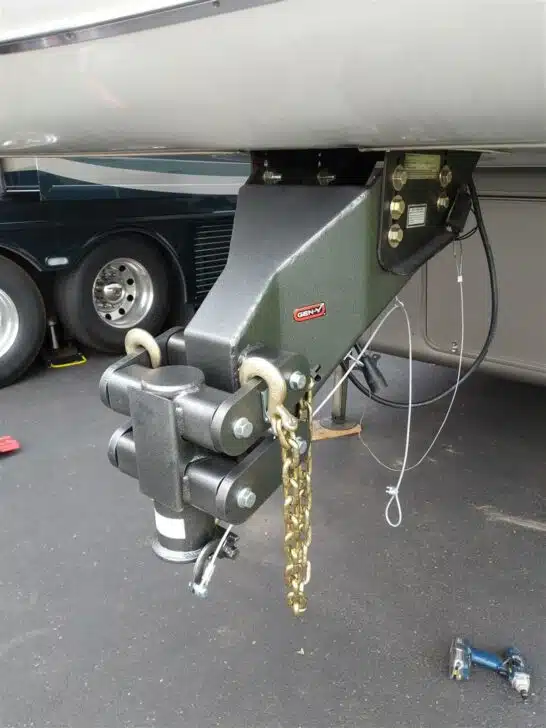
Our friends Tom & Cait Morton converted the kingpin on their fifth-wheel to a gooseneck by replacing it with a Gen Y gooseneck adapter (photo courtesy of MortonsOnTheMove.com)
Installation
The installation of a 5th-wheel hitch only requires that a few small holes be drilled in the truck bed for mounting with nuts & bolts (unless your truck came with a factory-installed 5th-wheel hitch).
Disadvantages of 5th Wheel Hitches
While 5th-wheel hitches are perfect for certain situations, they do have some cons to consider:
Lower Towing Capacity
A typical 5th-wheel hitch for a pickup truck tows up to 20,000 pounds, though a few can pull up to 27,000 pounds or more. Still, with only a few exceptions, most gooseneck hitches have a greater towing capacity than 5th-wheel hitches by at least 3,000 pounds (and by as much as 10,000 pounds!).
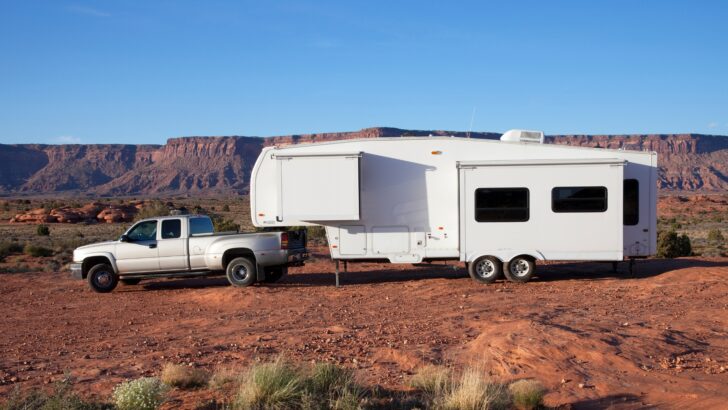
The average GVWR for fifth-wheel trailers is around 18,000 pounds, but some weigh as much as 20,000. A fifth-wheel hitch can tow most fifth-wheel RVs.
Space Occupied In the Truck Bed
A 5th-wheel hitch is very heavy and difficult to move, and it takes up a lot of space in the truck bed. In addition, the truck bed rails that the hitch connects to are permanently mounted to the floor of the truck bed and may interfere with your use of the bed when not towing your trailer.
While you can remove the hitch assembly from the truck bed (leaving only the rails), it’s no small feat as the hitch itself generally weighs over 100 pounds.
Cost
Because 5th-wheel hitches are more complex than gooseneck hitches, they’re significantly more expensive. It’s typically a one-time cost, but it is something to take into consideration.
Less Maneuverability (especially on uneven terrain)
Because the body of a fifth-wheel trailer is usually built so that it sits just above the top of the sides of the bed of the truck, maneuvering on uneven terrain can result in the fifth-wheel hitting (and damaging) the truck bed. This can also be a hindrance to maneuvering in tight spots, as the trailer can hit the back corners of the cab of the truck (part of the reason why sliding fifth-wheel hitches are desirable, especially for RVers towing with a short-bed truck).
Gooseneck vs 5th Wheel Hitches
At first glance, the choice between gooseneck and fifth-wheel hitches may seem daunting. However, if you consider their differences (and the pros and cons of each), you’ll likely know which hitch is best for your towing situation.
These hitches are typically used on specific trailer types (goosenecks are most common on large flat-bed trailers for hauling heavy equipment, while fifth-wheel hitches are much more common on, well, fifth-wheel trailers), making the choice (if you even have one) less daunting. As we’ve noted above, both types are convertible, but the real question is the type of trailer you’ll be towing regularly… and the conditions you’ll typically tow it.
For more information on 5th-wheel/fifth-wheel RVs, please see our post, “What Is a Fifth Wheel and Why Are They So Popular?”
And be sure to share your experiences towing with gooseneck vs 5th wheel hitches in the comments below. We’d love to hear!
Free RVing Tips, Tricks, Reviews & Giveaways
As 20-year full-timers, we share everything we’ve learned about RVing over the years. Join our online community to receive a wealth of great RVing knowledge delivered daily to your inbox.
Whether you’re a new RVer or a seasoned full-timer, you’ll love the wide range of RVing topics we cover. Don’t miss a single article or any of our famous Giveaways. Subscribe to our newsletter today!


MIKE LAMAGDELEINE
Sunday 21st of April 2024
I WOULD BE INTERESTED IN THE BUMPER RECEIVER TO GOOSENECK CONVERSION. I HAVE A OUTDOOR RV 25RDS WHICH WEIGHS IN AT 10000POUNDS. LIVING IN ALASKA MAKES ME WONDER IF THIS WOULD BE A GOOD CONVERSION.
Josh
Tuesday 23rd of April 2024
@MIKE LAMAGDELEINE,
It can be done, but is not very common.
https://www.mortonsonthemove.com/bumper-pull-gooseneck-conversions/
TheRVgeeks
Sunday 21st of April 2024
Hi Mike. Sorry if we weren't clear in the article, but you can only convert a fifth-wheel to gooseneck. Not a travel trailer. Or, at least, if you CAN convert a travel trailer to gooseneck, WE'VE never seen it!
Outdoors RVs are nicely built units! Hope you're enjoying yours.